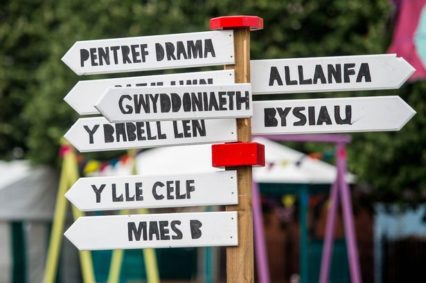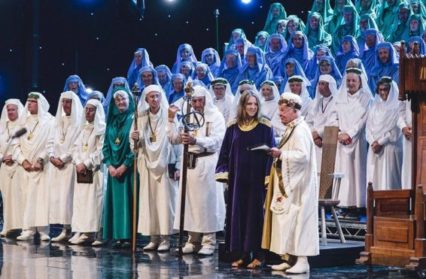Gary Raymond suggests that the new open and inclusive National Eisteddfod could form the cultural hub for a new push for Welsh independence, but first it needs to be bold and clean out some room at the top.
Well, hasn’t the National Eisteddfod been a breath of fresh air this year? Its new policy of accessibility, of an open-armed attitude to people of all languages certainly seems to have given the whole thing a bit of a jolt and created a new perception of the entire festival. I visited for the first time this week, previously having never really believed the Eisteddfod was for me. And that has always been fine. I don’t speak Welsh. The Eisteddfod is for Welsh-speakers. That has always been the ethos, and I haven’t felt it was my place to be there, the same reason I don’t go to gay clubs or Harry Styles concerts – these spaces are for other people, and I wish those people all the best.
To that extent, the National Eisteddfod has always been about Welsh language culture rather than simply Welsh culture. The names who pack out the Maes B are largely anonymous outside of Welsh language communities, and many of the medal winners – the artists and poets and musicians and singers – do not have names whose recognition travels beyond the borders of the Welsh language. The names that do ring familiar often do so because they ply their craft bilingually. And so as with most things in life, if a space wants exclusivity, few people are going to be that bothered about denying the exclusivity it desires. It’s isolationism, but who does it hurt, right?
But the protectors of the Welsh language have several new problems to contend with of late; there is the impending doom of Brexit of course, and who is going to be able to defend a language when we’re all fighting over rat carcases (rats who have themselves thrown themselves in front of whatever stands for post-apocalyptic on-coming traffic). Then there is the new ambition imposed upon it by the Welsh Government, who have declared a goal of Welsh language world domination by 2050. A policy of cultural isolationism, then, cannot work. Fears of the language slipping into obscurity with only the Welsh Language Act to save it, are of course perpetual, and expansion is now the only viable option to meet government targets. What better way to expand than to invite people in to the Eisteddfod, to show them that the language is vibrant, alive, and is part of a global tapestry of languages, not simply an anomaly tagged on to the shoulder of the all-conquering Shakespearean English? And, my god, it has worked. Nobody can have come away from Cardiff Bay this week feeling anything other than that Welsh is a living, breathing, modern European language. It made me, for one, feel very proud.
 Walking around the festival site, I was moved by the vibe, by the laughter and positivity, and, by god, by the diversity of faces in the crowds, men and women, young and old, Celtic, Anglo-Saxon, Eurasian, African etc etc etc. And without taking a rather creepy straw poll, nothing to suggest the crowd was unanimously heteronormative, either. As Yasmin Begum pointed out in her excellent article for Wales Arts Review yesterday, on the stage there is still much work to be done, but this is surely a step in the right direction.
Walking around the festival site, I was moved by the vibe, by the laughter and positivity, and, by god, by the diversity of faces in the crowds, men and women, young and old, Celtic, Anglo-Saxon, Eurasian, African etc etc etc. And without taking a rather creepy straw poll, nothing to suggest the crowd was unanimously heteronormative, either. As Yasmin Begum pointed out in her excellent article for Wales Arts Review yesterday, on the stage there is still much work to be done, but this is surely a step in the right direction.
The National Eisteddfod 2018 has opened its arms and people have walked in. Social media is incandescent with the images of a modern and unique festival, where even the robes and medallions of the Druids have looked something closer to a beautiful central tradition worn with a respectful sense of humour, rather than as an archaic silliness that outsiders traditionally see it as. But that is the point, isn’t it – this year there are meant to be no outsiders. This year the National Eisteddfod is about Welsh culture rather than just Welsh language culture, defined and executed by the protectorate of that language. No longer, (maybe?) the old tenet that Welsh language is for all of Wales unless you don’t speak it. Now (maybe?) something closer to the Welsh language is a central part of Wales and it belongs to the Welsh whether they speak it or not. Doubters of the Welsh language, often from places in Wales where centuries of English hegemony has been most keenly felt, will undoubtedly be won over by the sentiments pervasive at this year’s festival. As a PR exercise it has been a resounding success, and nobody can take that away from them.
This must be good news too for Plaid Cymru, the party who perhaps fit most comfortably alongside the traditional values of the Eisteddfod. As the United Kingdom ruptures in the wake of the EU Referendum result, and as both main UK parties battle with their own internal racist factions, you have to admit Plaid’s time seems to have come. Welsh independence will perhaps never have a better chance of being realised over the next few years – or at least we may see public shifts that make it one day inevitable, as has happened in Scotland in the last decade. To make that shift happen, the National Eisteddfod could play a vital role in convincing people that Wales can stand on its own two feet, because confidence in culture breeds confidence in politics.
If the National Eisteddfod can build on this year’s successes, then it can do a great deal to alter the way the geographical tribes of Wales think of themselves as a federal unit. Modern, open, progressive, European.
But wait… there’s always a but wait, right?
What’s that coming over the hill? It’s old white guys. Old white guys in positions of power and influence, kicking over statues and pissing on bonfires, stomping into the collective love-in with their size “things-were-different-in-my-day” boots.
Away from all of the positivity, there were two public (who knows how much more of this goes on away from the stage and in the committee rooms) displays of staggering bigotry, the nature of which were so idiotic, had they been suggested in a script meeting for the Thick of It Eisteddfod spin-off they would have been rejected out of hand.
On Monday, the Archdruid, when presenting the poetry crown to Catrin Dafydd, felt it appropriate to chip in that Dafydd couldn’t have achieved her success without the support of so many men in her life. Apparently it was a joke. If it was, it was from a distant era, laced with misogyny. He later apologised, and Dafydd graciously accepted the apology. But news reports all around Wales ran with a story not championing Dafydd’s work (who also won the Welsh language Wales Book of the Year this year for her novel, Gwales), but rather ran with the controversy. What should have been a celebratory moment for Dafydd is now one everyone would rather forget.
Worse, the Chair of the Eisteddfod’s governing body, in another hilarious joke, referred to the people of Uganda as “savages” from the main stage just a few days later. Eifion Lloyd Jones, however, has not apologised, rather instead arrogantly suggesting people just didn’t get the joke. (I’m sure Rowan Atkinson thought it was very well crafted). A few people have called for the Chair to step down, but of course people don’t step down in Wales, especially if they’re old white guys. And besides, it was just taken out of context. And context is everything. The word “savages” needs context, right? Just like when an old white guy uses the “n-word” or fa**ot, we all have to wait for a few moments while we digest the context before coming to a decision as to whether we should just laugh.
It must be frustrating for the expected 150,000 plus people attending this year’s festival in Cardiff Bay, that the headlines in non-Welsh language publications are being dominated by the bigotry of a few of the organisation’s governors. It must be frustrating for the team of Ashok Ahir, Chair of the Eisteddfod’s Organising Committee, who have apparently done more dinosaur-fighting than Ray Harryhausen in the last twelve months to make this year’s Eisteddfod the success it has been. I take my hat off to Ahir and his team.
But as we look for public figures to admire, it’s also worth noting Ahir has just become Director of Communications for the Wales Office, helping spin the message of Alun Cairns, a man who has consistently demonstrated as much love for Wales and its culture as I have for artwork sculpted out of human faeces.
There is no such thing as “just a job” in this political climate, just as there is no such thing as “just a joke”.
So is this the quality of character we can hope for should the National Eisteddfod play a role in moving the public opinion toward an independent Wales? On the floor of the festival, I am swayed toward a swell of national pride that could tip over to supporting independence as I’m sure many have found this week; but a look at the committee rooms and I am unmoved. I keep thinking of all those brilliant, enthusiastic, warm people I have met this week, working to promote the Welsh language, and then I think of those two men and their comments, and I cannot see how the two match up.
As Boris Johnson gets his head measured for his Make Britain Great Again cap, there was a real opportunity here for the National Eisteddfod to do the right thing, and throw these two old men out the back door, and to show the rest of Wales, many of us who are waiting for some leadership in these troubled times, that the National Eisteddfod still has some fences that will not be taken down: the ones that keep bigots on the outside.
Gary Raymond is editor at Wales Arts Review. His latest novel, The Golden Orphans is available now.



 Enjoyed this article? Support our writers directly by buying them a coffee and clicking this link.
Enjoyed this article? Support our writers directly by buying them a coffee and clicking this link.







